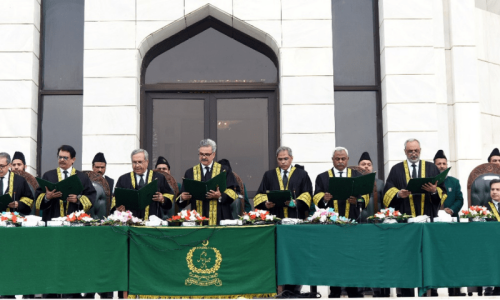ISLAMABAD: The government will enact a law to regulate street economy and give a legal status to around one million vendors who are making a remarkable contribution to the national economy.
Chairing a briefing on providing an enabling environment to street vending, Special Assistant to Prime Minister on Poverty Alleviation Faisal Karim Kundi noted that street vendors were important part of society and recognising them through legislation and regulations can help bolster the country’s economy.
Zia Banday, senior fellow PIDE and focal person for street vendors’ programme, gave a presentation on the ongoing programme in Islamabad, challenges facing it and the future roadmap.
The meeting was attended by Nadeem Afzal Chan, former PPP MNA, and officials from the ministry along with a representative of the street vendors.
Zia Banday apprised the meeting of the challenges faced by street vendors.
“The previous government didn’t provide legal status to the Rehrhi Ban project that’s why such a useful scheme had to face a closure in the initial stages,” said Mr Kundi, adding the present government will provide legal status to the project.
Street vendors discussed their fears and expectations with Mr Kundi who assured them of full support. He said vendors will only welcome the project if legal grounds were provided to the project. The project should be extended to provinces level, he added.
It was elaborated in the meeting that in comparison to other developing countries, street vendors remained neglected in Pakistan.
Based on a PIDE research survey, street economy of urban Pakistan is conservatively estimated at around Rs900-Rs1,000 billion with up to a million street vendors operating. This is an overwhelmingly cash, unrecorded and informal economy.
In 2021, the Ministry of Poverty Alleviation launched a street vendors’ initiative at limited scale for formalisation and financial inclusion of street vendors. The programme components enabled over 200 street vendors to acquire eco-friendly carts, microfinance loans and vending licences.
The participating street vendors have organised themselves in an association. And it is now facilitating digitalisation of street vendors through their digital onboarding, bookkeeping, online payments, lending and e-commerce with engagement with tech companies.
Nadeem Afzal Chan said ground realities of street vending demand a holistic engagement between political leadership and researchers for a sustainable solution.
The PPP has a long history of struggle for the emancipation of poor and it was willing to expand the intervention footprint for street vending across the country.
The street vendors said they were primarily facing problems of non-issuance and non-renewal of vending licences. Their relief under the government programme was under peril due to eviction threats from municipality officials.
They requested Mr Kundi to intervene in this matter. The SAPM showed his resolve in addressing the street vendors’ issues. He mentioned that the government will be engaging all stakeholders in first getting the street vendors’ law promulgated and then overseeing its implementation across the country.
He recognised street vendors as an integral part of urban economy, who have a legitimate socioeconomic role to play. He said the ministry of poverty alleviation will play a lead role in the provision of an enabling environment to street vendors.
Published in Dawn, November 19th, 2022










































